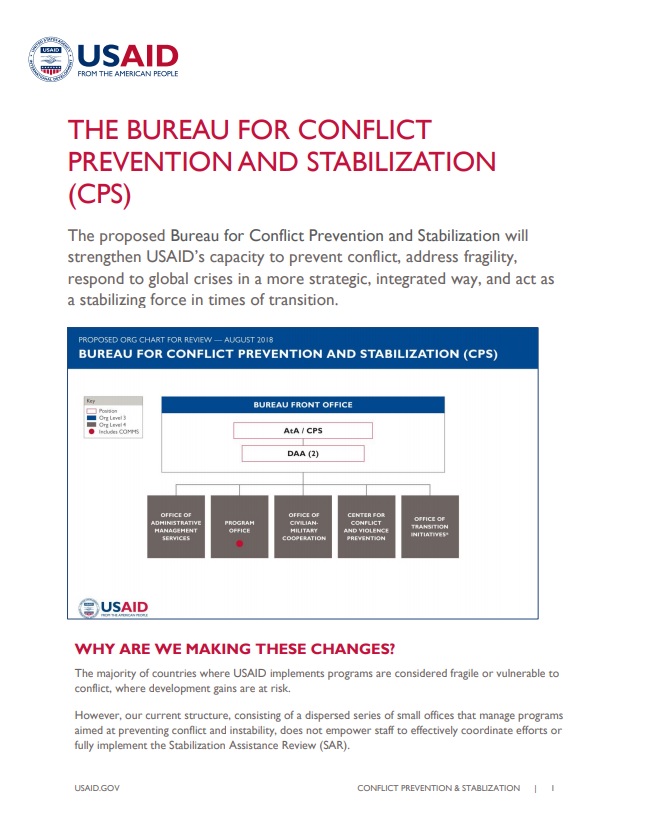Speeches Shim
The proposed Bureau for Conflict Prevention and Stabilization will strengthen USAID’s capacity to prevent conflict, address fragility, respond to global crises in a more strategic, integrated way, and act as a stabilizing force in times of transition.
![Bureau Front Office [Assistant to the Administrator, two DAAs] - Office of Administrative Management Services; Program Office (includes COMMS); Office of Civilian-Military Cooperation; Center for Conflict and Violence Prevention; Office of Transition Initiatives* Bureau Front Office [Assistant to the Administrator, two DAAs] - Office of Administrative Management Services; Program Office (includes COMMS); Office of Civilian-Military Cooperation; Center for Conflict and Violence Prevention; Office of Transition Initiatives*](https://2017-2020.usaid.gov/sites/default/files/styles/732_width/public/nodeimage/Fact_Sheet_The_Bureau_for_Conflict_Prevention_and_Stabilization_CPS.jpg?itok=0zt00UpQ)
WHY ARE WE MAKING THESE CHANGES?
The majority of countries where USAID implements programs are considered fragile or vulnerable to conflict, where development gains are at risk.
However, our current structure, consisting of a dispersed series of small offices that manage programs aimed at preventing conflict and instability, does not empower staff to effectively coordinate efforts or fully implement the Stabilization Assistance Review (SAR).
WHAT WILL THESE CHANGES DO?
Our proposed Bureau for Conflict Prevention and Stabilization (CPS) would strengthen USAID’s capacity to prevent conflict, address fragility, respond to global crises in a more strategic, integrated way, and act as a stabilizing force in times of transition.
The proposed Bureau for Conflict Prevention and Stabilization would:
- Create a stand-alone, but interconnected, Bureau to focus on the non-humanitarian aspects of a crisis and provide USAID with holistic crisis-response capabilities
- Concentrate current technical expertise on preventing and responding to conflict and violent extremism with flexible program mechanisms for fast and agile responses
- Establish a clear Agency lead on implementation of stabilization programming as directed in the Stabilization Assistance Review
- Create strong and institutional linkages to the Center for Democracy, Rights and Governance and strengthen support to USAID Missions
- Integrate CPS with humanitarian and development assistance through the Office of the Associate Administrator for Relief, Response and Resilience (R3)
CPS would serve as the U.S. Government’s technical lead on conflict and violence-prevention, and the implementation of political transition and stabilization programs in countries important for U.S. national security. The CPS Bureau would also manage the Complex Crises Fund (CCF).
CPS would enhance civilian-military communication, coordination and collaboration to inform and support both U.S. foreign policy and national security policy.
HOW WILL WE MAKE THESE CHANGES?
The proposed Bureau for Conflict Prevention and Stabilization would consolidate the current Bureau for Democracy, Conflict and Humanitarian Assistance (DCHA) Offices of Transition Initiatives (OTI), Conflict Management and Mitigation (CMM) — to become the Center for Conflict and Violence Prevention (CVP), Civilian-Military Cooperation (CMC), and Policy, Program and Management (PPM).
The Assistant to the Administrator (AtA) for CPS would report directly to the Associate Administrator for Relief, Response and Resilience.


Comment
Make a general inquiry or suggest an improvement.